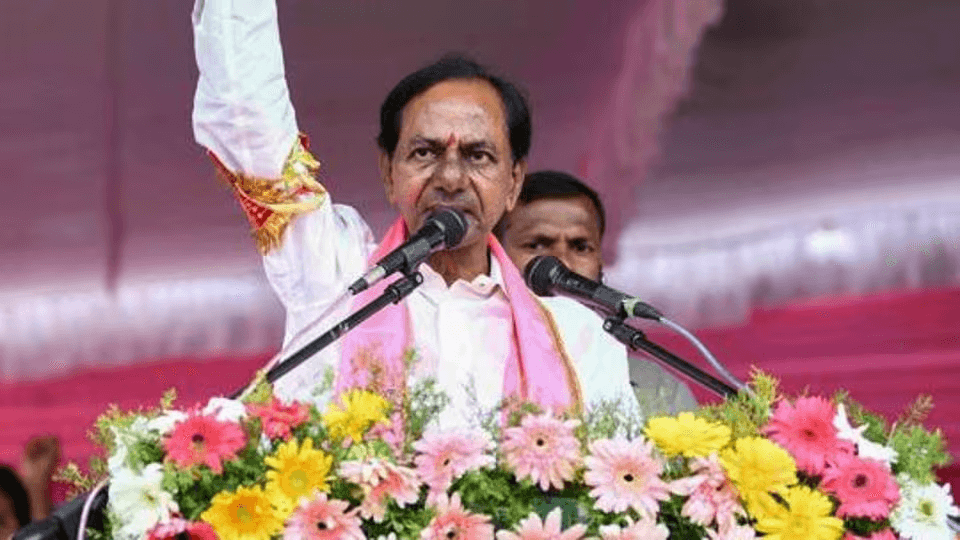KCR Biography
K. Chandrashekar Rao, popularly known as KCR, is a prominent Indian politician and the founder of the Telangana Rashtra Samithi (TRS), a regional political party in the state of Telangana. Born on February 17, 1954, in Chintamadaka village of Medak district in the erstwhile state of Andhra Pradesh, KCR has played a pivotal role in the formation of the separate state of Telangana.
KCR’s early life was marked by a deep-rooted association with agriculture, as his family belonged to a farming community. He pursued his education at the Osmania University in Hyderabad, where he developed a keen interest in politics. His political journey began in the early 1970s when he actively participated in the Telangana movement, advocating for the rights of the people of Telangana and their demand for a separate state.
In the initial years of his political career, KCR was associated with the youth wing of the Janata Party. Later, he joined the Telugu Desam Party (TDP) led by Nandamuri Taraka Rama Rao (NTR), a popular actor-turned-politician. KCR played a significant role in the TDP’s political activities and gradually rose through the ranks. However, differences emerged between him and the TDP leadership, leading to his resignation from the party in 2001.
Determined to address the long-standing aspirations of the people of Telangana, KCR founded the Telangana Rashtra Samithi (TRS) on April 27, 2001. The party’s primary objective was to fight for the creation of a separate state of Telangana, arguing that the region had been historically marginalized and neglected in terms of development.
KCR’s leadership and the TRS’s efforts gained momentum over the years, particularly during the Telangana movement that peaked around 2009. The movement saw widespread protests, demonstrations, and public support for the cause of Telangana. KCR’s charismatic leadership and strategic political moves played a crucial role in garnering support for the demand for statehood.
After years of persistent efforts, KCR and the TRS achieved a historic milestone when the Government of India, under Prime Minister Manmohan Singh, announced the formation of the new state of Telangana on July 30, 2013. KCR’s vision and unwavering commitment to the Telangana cause had finally come to fruition.
In the subsequent years, KCR focused on consolidating the political landscape in Telangana. In the newly formed state, he assumed office as the first Chief Minister of Telangana on June 2, 2014. The TRS secured a significant mandate in the state assembly elections held in April 2014, winning 63 out of 119 seats.
As Chief Minister, KCR initiated various welfare and development programs to address the socio-economic needs of the people of Telangana. His government implemented schemes like “Mission Bhagiratha” to provide safe drinking water to every household, “Kalyana Lakshmi” to support the marriage of economically disadvantaged girls, and “Rythu Bandhu” to provide financial assistance to farmers.
KCR’s leadership style has been characterized by a mix of populism and a strong emphasis on regional identity. His government has focused on issues like irrigation projects, welfare programs, and infrastructure development to uplift the standard of living in Telangana. At the same time, KCR has faced criticism on issues such as governance transparency, agrarian distress, and unemployment.
In the 2018 state assembly elections, the TRS secured a resounding victory, winning 88 out of 119 seats. KCR was re-elected as the Chief Minister, and his party’s dominance in Telangana politics remained unchallenged.
Beyond state politics, KCR has occasionally engaged in national political discussions. He has advocated for the formation of a non-BJP, non-Congress federal front, positioning himself as a key player in regional politics with the potential to influence national political dynamics.
KCR’s political journey is marked by his relentless pursuit of the Telangana statehood cause, transforming him into a charismatic and influential leader in Indian politics. As the Chief Minister of Telangana, he continues to shape the destiny of the state, facing both accolades and criticisms for his policies and governance approach. The legacy of K. Chandrashekar Rao is intricately woven into the socio-political fabric of Telangana, reflecting the aspirations and challenges of a region that has undergone a profound transformation in recent years.
For more Biographies: Biography – Facts Blog




Recent Comments